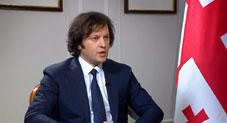The News in Brief
Thursday, May 23, 2024
Prepared by Messenger Staff
Prime Minister Kobakhidze: Venice Commission Rejects 'Professional Dignity' and Lacks Legal Arguments
 Prime Minister Irakli Kobakhidze criticized the Venice Commission, stating that it had rejected "professional dignity" and assessed that the conclusion "lacks legal arguments".
Prime Minister Irakli Kobakhidze criticized the Venice Commission, stating that it had rejected "professional dignity" and assessed that the conclusion "lacks legal arguments".
"I read the conclusion, and as a jurist, I can say that the Venice Commission has rejected professional dignity altogether. I felt uncomfortable as a jurist when I read this document; the face the Venice Commission showed was so weak. They have nothing to say, and the document is full of absurd entries and lies. Along with many lies, there is completely absurd legal reasoning without arguments," said Kobakhidze in an interview with the public broadcaster.
According to him, the public is not focused on what the Venice Commission said, but on where the "truth" is.
"That's why we sometimes say that today our country is more sovereign than ever before. This means that they value the independence of our country more than they did even 3-4 years ago," added Kobakhidze.
GYLA Questions Whether Judges Appointed for Life Were Interviewed
 The Supreme Council of Justice of Georgia appointed 21 judges for life with a majority of 15 votes. However, the Georgian Young Lawyers Association has raised concerns regarding whether the Supreme Council of Justice conducted interviews with these judges, as required by the procedure.
The Supreme Council of Justice of Georgia appointed 21 judges for life with a majority of 15 votes. However, the Georgian Young Lawyers Association has raised concerns regarding whether the Supreme Council of Justice conducted interviews with these judges, as required by the procedure.
GYLA stated that the Council did not publish information about the interviews with judges appointed for life on its website.
"The election of judges to be appointed for life was unexpected for the monitoring organizations, as the procedure provides for an interview with candidates who are on a three-year probationary period. Information about the interviews with these judges was not published on the website of the Council; therefore, it is not known whether the interviews were conducted at all. If they were conducted, it is unclear why monitoring organizations were not given the opportunity to monitor them," GYLA stated.
Prime Minister Kobakhidze: Venice Commission Rejects 'Professional Dignity' and Lacks Legal Arguments

"I read the conclusion, and as a jurist, I can say that the Venice Commission has rejected professional dignity altogether. I felt uncomfortable as a jurist when I read this document; the face the Venice Commission showed was so weak. They have nothing to say, and the document is full of absurd entries and lies. Along with many lies, there is completely absurd legal reasoning without arguments," said Kobakhidze in an interview with the public broadcaster.
According to him, the public is not focused on what the Venice Commission said, but on where the "truth" is.
"That's why we sometimes say that today our country is more sovereign than ever before. This means that they value the independence of our country more than they did even 3-4 years ago," added Kobakhidze.
GYLA Questions Whether Judges Appointed for Life Were Interviewed

GYLA stated that the Council did not publish information about the interviews with judges appointed for life on its website.
"The election of judges to be appointed for life was unexpected for the monitoring organizations, as the procedure provides for an interview with candidates who are on a three-year probationary period. Information about the interviews with these judges was not published on the website of the Council; therefore, it is not known whether the interviews were conducted at all. If they were conducted, it is unclear why monitoring organizations were not given the opportunity to monitor them," GYLA stated.
